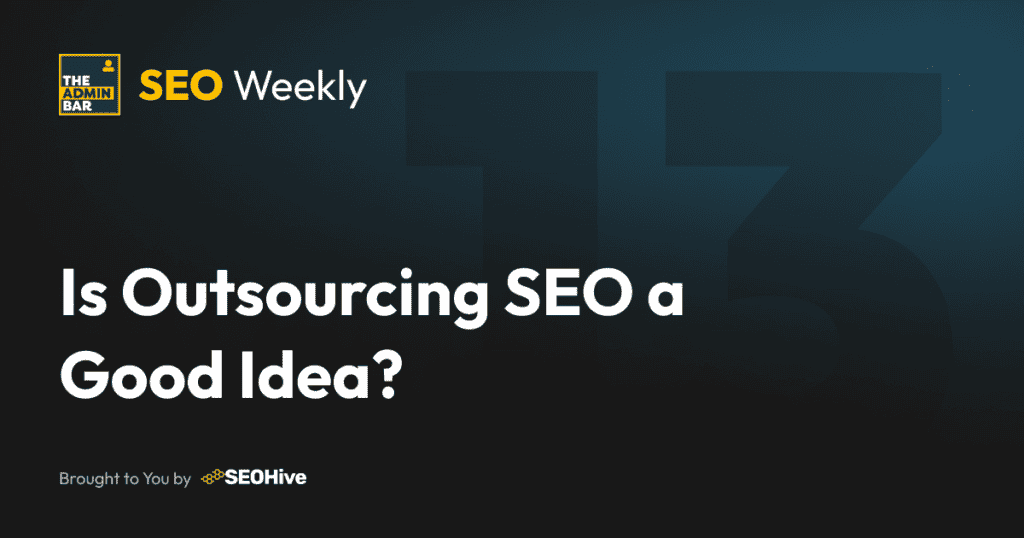Running an agency isn’t easy…
We all know that building monthly recurring revenue is essential for agency stability, and SEO services offer great MRR potential. But delivering consistent SEO work month after month? That’s where many agencies start to struggle and where serious consequences lie.
So the inevitable question arises: “Should I just outsource this?”
Having been on both sides of this predicament as an agency owner and service provider, here’s my take on when outsourcing SEO makes sense – and, possibly more importantly, when it doesn’t.
When It Makes Sense to Outsource
✅ When your expertise lies elsewhere
SEO requires specialized knowledge that takes time to develop. If your team excels in design or development, it isn’t realistic to become an SEO expert on the job and see tangible results for clients quickly.
✅ When you’re already at capacity
If you’re promising SEO results but constantly struggling to find the dedicated time for delivery, that’s your sign you’ve got too much on.
✅ When hiring full-time specialists isn’t viable
Building an in-house SEO team means hiring for multiple disciplines – content, technical, link building, etc. – which quickly adds up, and it isn’t always feasible in one go. Not-to-mention the economies of scale in needing multiple agreements to cover multiple salaries.
✅ When consistency is suffering
SEO demands ongoing, regular work that follows a strategy. If your delivery becomes sporadic because of other priorities, results will inevitably suffer and believe me, it’s NEVER nice to lose a retained client.
One of the sad truths I see a lot is that agencies think that because they built a successful care plan process, SEO will work the same way. Unfortunately, this is rarely the case due to the vast skillset needed to deliver a holistic SEO program, where Care Plans sit very firmly in the development space.
When Outsourcing Isn’t the Answer
❌ When you want a “set it and forget it” solution
Outsourcing reduces your tactical workload but doesn’t eliminate your management responsibility. Liaison between the supplier and client is still all down to you!
❌ When you can’t clearly define success
Without specific goals and expectations, you’re setting both sides up for disappointment. This can be remedied as easily as having a meeting with the client – but it’s up to you to do this.
❌ When budget is your only consideration
Quality SEO services aren’t “cheap”! I don’t buy the pitch that all SEO has to cost $X,000’s, but on the same note, those $99 / month packages are cutting corners somewhere!
❌ When you need deep industry-specific knowledge
Some niches require subject expertise that generalist SEO providers simply won’t have (pharmaceutical, for example). In these cases it really is best to pass the client over to a company that specializes in SEO for their niche.
That’s not to say it’s all on you either 🤨 Some providers are just better than others…
What Separates Good SEO Partners from Bad Ones
After years of seeing this from both sides, here’s what I see that matters:
1. Proactivity
A good outsource partner identifies opportunities and issues before you have to ask. They bring ideas to you, as well as respond to your requests.
2. Customized vs. Cookie-Cutter
An effective SEO partner will adapt their strategies to each client’s unique situation, not apply the same template to everyone. That’s not to say that deliverables shouldn’t be defined or that they may not have a “suite” of products they can choose from, but there needs to be flexibility in their approach.
3. Execution vs. Recommendations
A true partner delivers actual work products, not just a list of tasks for your team to implement. (We see this SO much! 🤦)
4. Transparency
You should know exactly what’s being done, why, when you should expect it, and by whom – no mysterious processes or hidden methods.
5. Accessibility vs. Gatekeepers
I’ll be honest, from the supplier side this is a tough one, but it kinda goes hand-in-hand with the point above. Some companies use “managers” as gatekeepers so requests have to escalate up and down a process – this is often built in to slow the process down and, often, to get out of doing the work. Having access to the teams/people who will ACTUALLY be doing the process is key for the effective running of a campaign.
6. Strategic Input vs. Tactical Execution
The best partners connect their SEO efforts to business outcomes, not just technical metrics. Your SEO partner should be able to take the commercial goals you present to them and hook them into their strategy and reporting.
What Even Good Outsourcing Still Requires From You
Outsourcing SEO doesn’t mean washing your hands of it entirely. You’ll still need to:
– Provide clear objectives and business context.
– Review work and offer constructive feedback.
– Connect SEO efforts with other marketing initiatives.
– Manage the client – their expectations and their wishes.
– Do the all-important billing!
The SEOHive Approach
Right from the outset, we focused on addressing the pain points we experienced as agency owners ourselves to become a true extension of your team. This means being transparent, allowing our staff to communicate with our agency partners, being proactive and, sometimes, having difficult conversations.
That said, we’re not for everyone – and that’s by design. Finding the right fit in values, communication style, and expectations is crucial for any outsourcing relationship – we have our way, and if that doesn’t fit with you there’s no pressure for you to conform.
What to do next:
If you are thinking of outsourcing to anyone (including me!), make sure you ask your potential SEO partners:
1. Who will be doing the actual work, and how do I communicate with them?
2. How will you adapt your approach for specific clients?
3. What concrete deliverables will I receive each month, and what will flex depending on need?
4. How do you tie your efforts back to business results?
5. What’s your typical response time for questions or concerns?
6. What do you need from me each month, and when do you need it?
7. When can I expect deliverables back from you each month?
8. What are the means to contact you (outside of your project management system) if I have concerns during our working arrangement?
What’s been your experience with outsourcing SEO? Any things you think I’ve missed? Drop them in the comments below. 👇
Join the Conversation!
There's a dedicated thread on this post inside of The Admin Bar community. Join in on the conversation, ask questions, and learn more!
Group Thread





